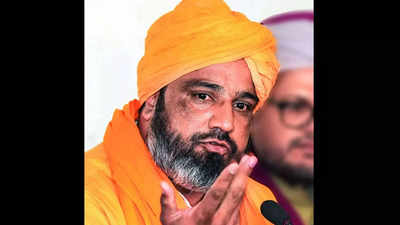[ad_1]

NEW DELHI: At odds with the place of All India Muslim Private Legislation Board, All India Sufi Sajjadanashin Council (AISSC) — an apex physique representing sufi shrines from throughout nation led by Syed Naseruddin Chishty from Ajmer dargah — welcomed govt’s proposal to amend Waqf Act. Chishty alleged that waqf boards work in a “dictatorial” method and cited dargahs as one the most important “victims” of mismanagement & corruption consuming into the waqf system.
Citing that sufi traditions will not be recognised beneath the present legislation, Chishty who’s AISSC chairman has raised demand for a separate dargah board beneath the legislation.Representatives of distinguished dargahs together with Delhi’s Nizamuddin Auliya and Agra’s Fatehpur Sikri and representatives of sufi shrines from Rajasthan, Hyderabad and Karnataka have been current at a press convention in Delhi.
They highlighted that smaller dargahs are sometimes slapped with notices leading to countless authorized battles. Chishty shared that there are about 2,000 dargahs together with small ones throughout nation and round 800 distinguished ones are related to the council.
AISSC representatives, met Nationwide Safety Adviser Ajit Doval and minority affairs minister Kiren Rijiju on Monday. Chishty mentioned they have been assured that “all stakeholders will probably be consulted and amendments will probably be within the curiosity of Muslims.”
On Tuesday, Rijiju in a submit on X described the interplay with AISSC representatives as a “fruitful and ahead trying dialogue” and highlighted that they praised the efforts of PM Narendra Modi-led govt in the direction of welfare of minorities.
To questions on AIMPLB and different Muslim organisations opposing proposal for amendments and citing it to be an assault on rights of Muslims, Chishty requested these opposing how that they had made up their thoughts with out even seeing the Invoice. He cautioned the Muslim group to not fall prey and warned towards “false propaganda” and trying “to divide society primarily based on faith.”
Chishty, nevertheless, underlined the necessity for wider consultations on the Invoice with stakeholders. “Within the current Waqf Act, there is no such thing as a point out of dargahs in any respect. Waqf Boards don’t recognise traditions of the dargah as lots of our traditions will not be there in sharia, so we demand a separate Dargah Board,” he mentioned.
Of their memorandum to Doval and Rijiju, Chishty mentioned, “Our council and numerous organisations have constantly submitted memorandums over the previous a long time, urging amendments to the legislation. “Following a radical examination of the draft Invoice, we intend to submit our suggestions and proposal. Consequently, it’s crucial that the proposed amendments prioritise the pursuits and safeguards of dargahs and their precise representatives,” he added.
[ad_2]
This Publish might comprise copywrite


